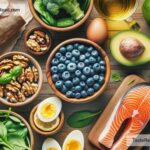Foods to Enhance Your Circadian Rhythm: Eat for Better Sleep and Energy
The circadian rhythm is your body’s internal clock. It helps you wake up in the morning, feel energized throughout the day, and sleep well at night. When this clock is in sync, you feel healthy and alert. However, if it gets disrupted—due to stress, late-night screen time, or irregular schedules—you might struggle to sleep, feel groggy, or experience low energy.
Fortunately, food can play a big role in supporting your circadian rhythm. What you eat, and when you eat, can positively or negatively affect your body’s natural clock. In this blog, we’ll explore simple foods and eating habits that can help you boost your circadian rhythm and improve your overall health.
How Food and Circadian Rhythm Are Connected
Your circadian rhythm doesn’t only respond to light. It also responds to cues from food. Most of the systems in your body run on this 24-hour clock, including digestion and metabolism. Eating the right nutrients at the right times can help keep your rhythm balanced, while eating too late or choosing unhealthy foods can throw it off.
For example:
– Morning: Foods that give you energy in the morning help signal your body to “wake up” and start your day.
– Evening: Foods that promote relaxation and sleep prepare your body for rest.
Let’s dive into specific foods that can support your circadian rhythm.
Morning Foods for Energy and Alertness
In the morning, it’s important to eat foods that give you steady energy. This helps your body kickstart its day and keeps your metabolism running smoothly.
Complex Carbohydrates
- Examples: Oats, whole-grain bread, quinoa
- Why they help: These carbs provide a slow, steady release of energy throughout the morning. They also prevent sugar crashes, which can make you feel tired.
Proteins
- Examples: Eggs, nuts, seeds, yogurt
- Why they help: Protein gives you sustained energy and keeps you full longer. It also helps regulate hormones that control your circadian clock.
Foods Rich in Vitamin D
- Examples: Salmon, mushrooms, fortified cereals, milk
- Why they help: Vitamin D is crucial for keeping your circadian rhythm in sync—it helps regulate sunlight signals in your body.
Healthy Fats
- Examples: Avocado, olive oil, chia seeds
- Why they help: Healthy fats fuel your brain and promote alertness during the day.
Midday Foods for Stamina
Lunchtime is an opportunity to refuel and keep your energy levels stable. Avoid heavy meals that will make you feel sluggish in the afternoon. Instead, aim for balanced meals with fiber, protein, and low-glycemic carbs.
Leafy Greens and Vegetables
- Examples: Spinach, kale, broccoli
- Why they help: These are rich in magnesium and antioxidants that support your energy without crashing later.
Lean Proteins
- Examples: Chicken, fish, tofu, beans
- Why they help: Protein at lunch helps maintain steady energy and supports brain health.
Whole Grains
- Examples: Brown rice, barley, farro
- Why they help: They provide fiber and energy for the rest of your day, without spiking blood sugar levels.
Fermented Foods
- Examples: Kimchi, yogurt with live cultures, sauerkraut
- Why they help: These foods are good for gut health, which plays an important role in regulating digestion as part of your circadian rhythm.
Evening Foods to Promote Relaxation and Sleep
Dinner is an opportunity to signal to your body that it’s time to wind down. Eating too late or consuming heavy, high-fat foods can make it harder to sleep. Instead, focus on light and sleep-promoting foods.
Foods Rich in Melatonin
- Examples: Cherries, bananas, oats, walnuts
- Why they help: Melatonin is the hormone that helps regulate sleep. These foods naturally contain melatonin or help your body produce it.
Magnesium-Rich Foods
- Examples: Almonds, pumpkin seeds, dark leafy greens
- Why they help: Magnesium relaxes your muscles and can help you fall asleep faster.
Herbal Teas
- Examples: Chamomile, peppermint, valerian root tea
- Why they help: Herbal teas are caffeine-free and can calm your nervous system, preparing your body for a restful sleep.
Avoid Heavy Meals
- Try to eat dinner at least 2-3 hours before bedtime to give your body enough time to digest the food. Heavy meals too close to bedtime can disrupt sleep and make your circadian rhythm out of sync.
Tips for Eating to Support Circadian Rhythm
Beyond the foods you choose, your eating habits also matter. Here are a few tips to keep your eating schedule circadian-friendly:
-
Eat Breakfast Soon After Waking Up
This signals to your body that it’s time to start the day. -
Stick to Regular Mealtimes
Eating at consistent times helps your body predict when food is coming, keeping your internal clock steady. -
Limit Late-Night Eating
Eating late at night can confuse your body’s natural sleep signals. Instead, stop eating at least 2-3 hours before bedtime. -
Stay Hydrated
Drink plenty of water throughout the day, but reduce liquids before bed to avoid disrupting your sleep. -
Avoid Caffeine and Alcohol in the Evening
Both can interfere with your sleep and throw off your circadian rhythm.
Conclusion
Your circadian rhythm is essential for your well-being, and the foods you eat can significantly impact it. Start your day with energy-boosting meals, refuel with balanced lunches, and end with light, sleep-promoting foods. Pair these food choices with regular mealtimes and healthy habits, and you’ll be on your way to aligning your internal clock.
Eating for your circadian rhythm isn’t complicated—it’s simply about choosing nutritious, whole foods that support your body’s 24-hour cycle. Take care of your clock, and you’ll enjoy better sleep, sharper focus, and consistent energy all day long!
What changes will you make to your diet to improve your circadian rhythm? Let us know in the comments!


